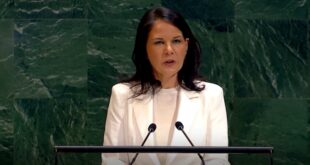During his visit to Berlin last week, President Muhammadu Buhari spoke in an exclusive interview with Deutsche Welle’s Phil Gayle. The Nigerian leader talked about the Niger Delta millitants, corruption, the judiciary and the fate of the remaining Chibok girls kidnapped by Boko Haram. He also said his wife should stay out of politics.
DW: First of all, congratulations on the rescue of 21 of the Chibok schoolgirls. How did you manage that?
President Buhari: The federal government of Nigeria has always preferred to talk to bona fide Boko Haram leaders about the release of the Chibok girls, but we must have a credible person or persons that will intervene, preferably United Nations or NGOs. I think that the federal government of Nigeria team insisted on a better type of arrangement and we secured 21 out of about 220 of the Chibok girls.
Do we know what has happened to the rest?
That is what we are trying to find now. The more we get, the more information we get about the balance, whether they are dead or alive … and where they are. The important thing about really insisting on the go-betweens – especially NGOs, the United Nations – is the credibility of persons that will be talking to the federal government.
Let’s turn to your reasons for being here in Germany. You’ve been meeting with Chancellor Angela Merkel. What is it that Nigeria wants from Germany?
A lot. We want German investors. As you know, there are about 100 German companies in Nigeria, and German investors have earned a lot of respect from Nigeria because of the quality of the manufactured goods they produce, especially machinery. … Nigerians work very hard to learn as much as possible, and attract German investment in manufacturing, especially.
Nigeria is going through its worst recession for decades, according to your own Bureau of Statistics. You have this Boko Haram insurgency. You have the Niger Delta rebels. Why would German investors invest in a country that has such problems?
German investors have been in Nigeria long enough, and they have seen so many governments, especially in the last 16 years. There was 16 years of the other party we took over from and eight successive governments, and all this time the German investors have survived it. So, they know a lot of details and they found out about the difference between the previous government and the incoming government.
One of your big election pledges was to tackle corruption. This drive has seen you jail judges and police chiefs – even your own former national security adviser. What was the problem, as you saw it, with corruption in Nigeria?
Well, I think I will tell you what I clearly understand. The foreign companies, especially oil prospects and development companies, have been in Nigeria for about two generations – 40 years and above and so on. So, they know the environment, they stayed that long, they continue to invest because they know the potential Nigeria has in oil and gas, and the capacity of the people to learn and work hard. That’s why they are still prospecting in Nigeria and so on. The thing that the Nigerian government will do is to secure the environment. If the environment is not secured, then unfortunately, the investments wouldn’t be coming in.
Your country’s bar association accuses you of using corruption arrests as a way of intimidating the judiciary.
Well, we are under a different system. … In 1984 and 1985, I told very curious people like you, then, in the military, what we did. The people arrested were put in prison and they were told they were guilty until they could prove their innocence. This time around, as you can see … they are all innocent until we can prove them guilty. This process is much easier. We have to start from the institution where they work, to their bank accounts, either inside or outside Nigeria, before we can prosecute them, take them to court and get them prosecuted.
Recently your wife criticized your choices for top jobs, and you responded by saying “I don’t know which party my wife belongs to, but she belongs to my kitchen and my living room.” What did you mean by that, sir?
I am sure you have a house. … You know where your kitchen is, you know where your living room is, and I believe your wife looks after all of that, even if she is working.
That is your wife’s function?
Yes, to look after me.
And she should stay out of politics?
I think so.
Now, one of your country’s big acts was the Gender Equality Act, which failed to pass the National Assembly.
When it eventually passes, the presidency will look at it as part of our constitutional law.
And you believe that gender equality is a good thing?
It is a good thing to the extent that it is accepted culturally throughout the country.
This interview has been edited and condensed.
 THE AFRICAN COURIER. Reporting Africa and its Diaspora! The African Courier is an international magazine published in Germany to report on Africa and the Diaspora African experience. The first issue of the bimonthly magazine appeared on the newsstands on 15 February 1998. The African Courier is a communication forum for European-African political, economic and cultural exchanges, and a voice for Africa in Europe.
THE AFRICAN COURIER. Reporting Africa and its Diaspora! The African Courier is an international magazine published in Germany to report on Africa and the Diaspora African experience. The first issue of the bimonthly magazine appeared on the newsstands on 15 February 1998. The African Courier is a communication forum for European-African political, economic and cultural exchanges, and a voice for Africa in Europe.
















